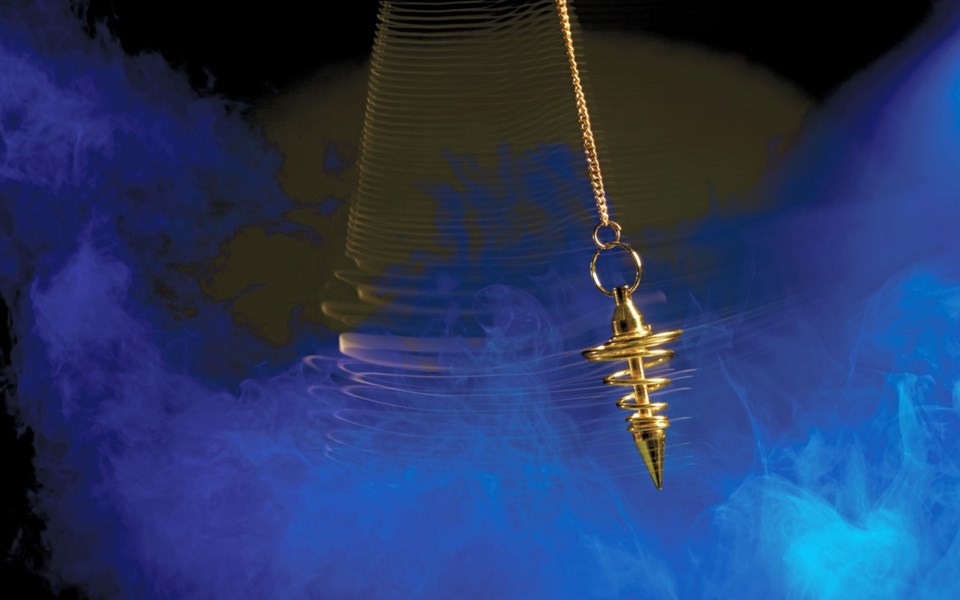There's a rapid fall as the pendulum drops from the right on its descent to the middle; it stays suspended for a time at the bottom of its arc before seizing momentum and rising left again.
The pendulum of life, the one that normally swings from challenge to opportunity, from season to season, has shifted to overdrive. The new pandemic-fuelled pendulum of emotions, hopes, concerns, and even intense darkness is our new shared reality. This pendulum of despair and optimism has significant force.
My personal pendulum normally sways as life undulates, but now it shifts hourly and sometimes from minute to minute. But here we are, all of us, as we bear witness to our shared reality, without a clear end in sight; thrust literally from feast to famine overnight.
This pandemic pendulum is shared with my community, with all British Columbians, and with our distressed world. One day I live fully in gratitude, in the moment, grateful for my health, for my home in Whistler, grateful for the love of my husband and family, and for the resilient spirit of my community.
At the other side of the pendulum I have more anxiety than I have ever known. My parents live in the U.S., where I watch the horror movie unfold by the hour south of our closed border.
I feel the distress across our community as I watch the challenges our entire region is facing. This experience on the left side of the pendulum is shared by all of us as residents, local governments, provincial and federal leaders, social-service organizations, large- and small-business owners; we're all together on this uber-fuelled, pandemic pendulum.
So how do we stay in that space that we normally occupy, where the pendulum sways seem manageable, where we co-exist with the teeter-totter of our regular lives?
In my case, I've seized hold of my mindfulness practice. This is my tool to stare down and slow the pendulum and its power over me.
Mindfulness gives me an instrument to observe, to pay attention, to notice when I start to climb onboard the fear-inducing ride.
I watch as the left tries to take hold, as the panic sweeps across my upper body and I feel like a heavy foot is pressing down on my chest. Then I shift right—usually when I get outside in the fresh air. This is when I witness community and caring; I share a smile or wave with someone else momentarily on the right too.
And every morning, early, I just sit. I sit and I breathe, and I observe what breathing and being still feels like.
It's as simple as that and yet not so simple. Sitting still is not a new thing for me. I've had a mindful-meditation practice for more than two decades. I'm not at peace with this frightening experience, this global scourge, but being mindful allows me to keep at bay the left, the side that can feel dismal, like grieving someone I've known my entire life.
Mindfulness is a tool that allows me to reflect and feel somewhat settled in this greatly shifting time. This idea of presence isn't something to "get" or research online (although you can certainly do so), it's inside each of us.
Mindfulness is a personal awareness practice. It's the action of taking notice, of observing one's own feelings and thoughts so we can rest and settle our minds. The opportunity for mindfulness is everywhere.
When I wash my hands mindfully and deliberately for my health, and that of others in my community. While I write the grocery list for my solo, once-a-week, quick foray, conscious while in the store to thank all the staff I see. When I speak to a community member or a business owner on the phone about their worries, I listen deeply to demonstrate that I do hear them, and I'll do my best to seek out the information they need. When I sit at my dinner table each evening and share gratitude with my guy. We're so grateful to be Canadian, to have a public health system such as ours where the frontline is the true battlefield.
I draw on mindfulness as a tool, like something I would include on a hike, something I would pack along like a nourishing lunch or an extra layer. Mindfulness is an essential piece of equipment to manage the great sweeps of the pendulum as it attempts to rock us all wildly back and forth.
Mindfulness is not a cure, but it allows me to feel like I've reached camp before dark, like I've still got water left in my canteen.
Before the next sweep shifts left again, before it gets too dark, check out what's in your own pack. You may find a version of mindfulness there for you that could bring some emotional moderation in this troubled time.
Wash your hands, keep your distance and be mindful.
Nicola Bentley lives in Whistler, where she is a facilitator, writer and mindfulness educator.




